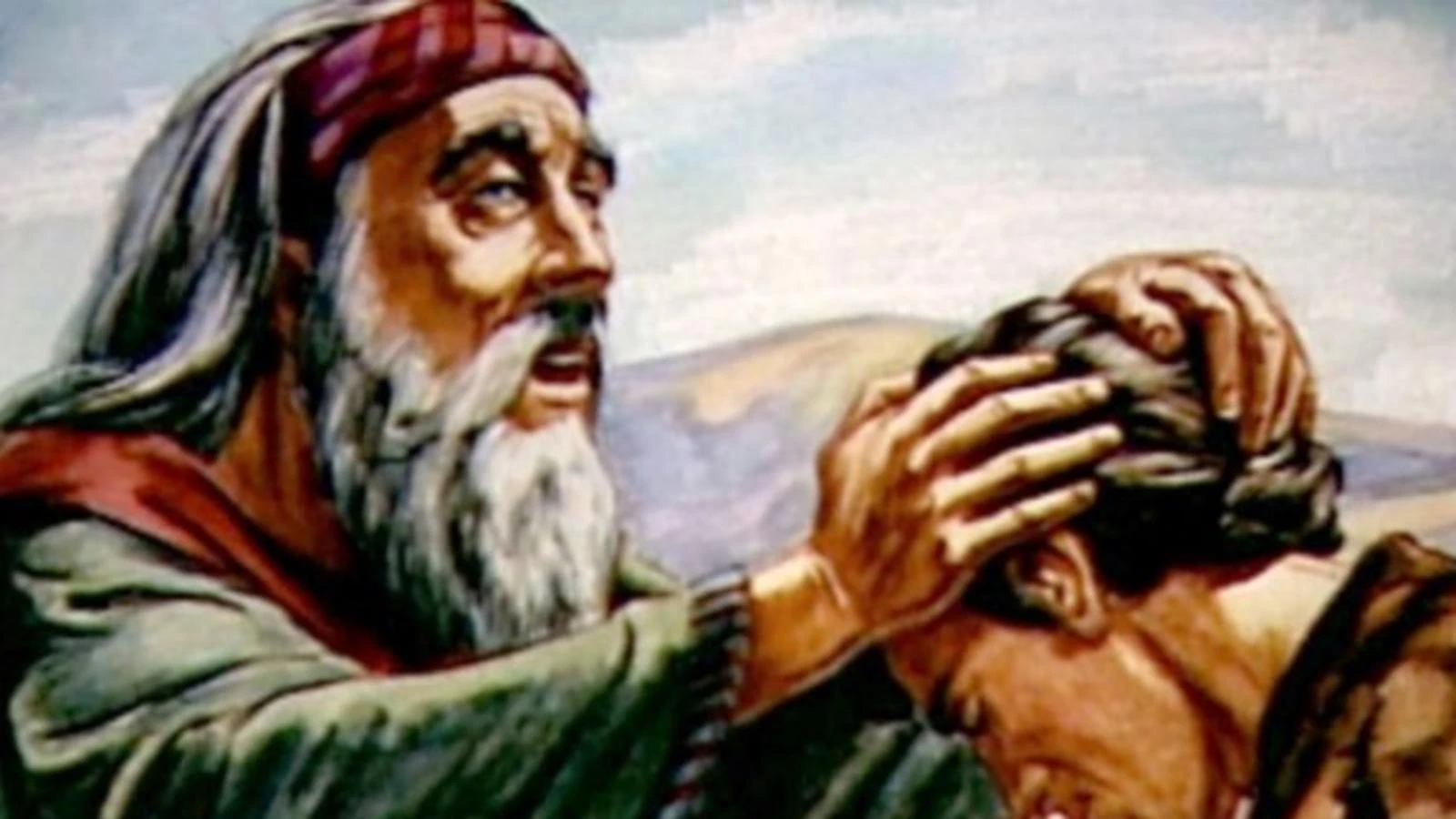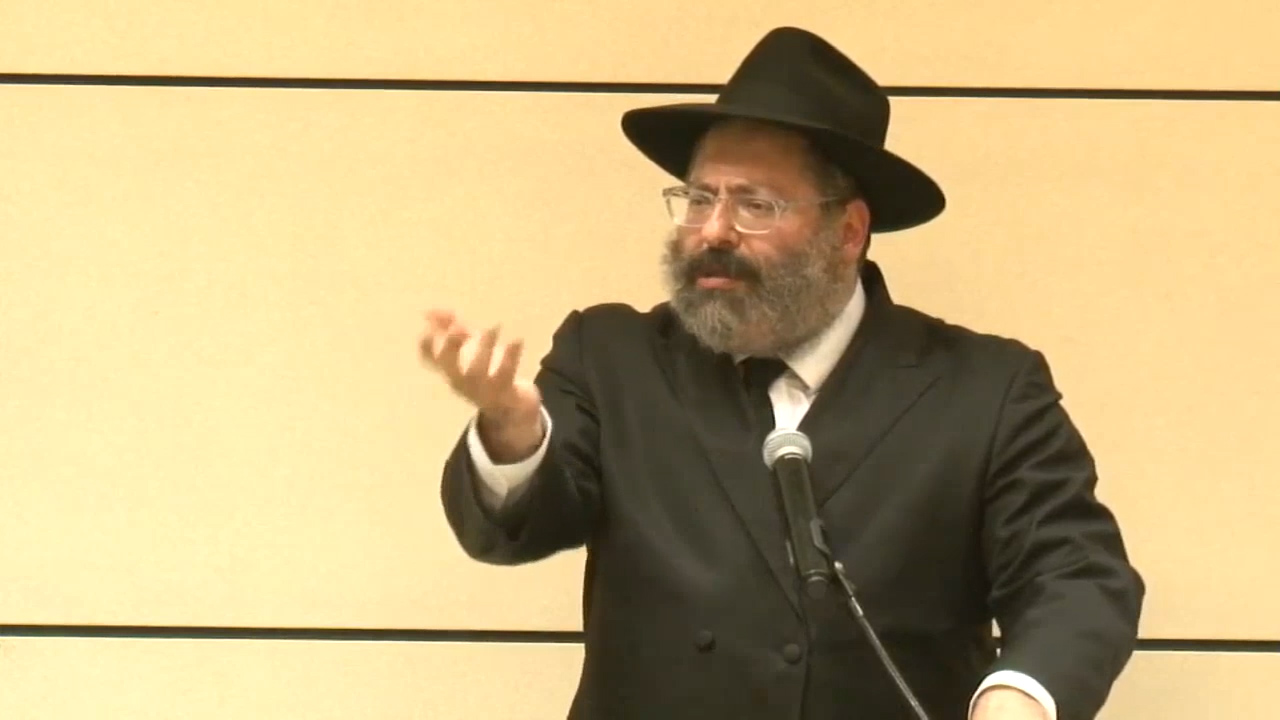The Story of the Modern Jew
Why Did Rebecca Dress Jacob in Esau's Clothes? Because She Was Thinking About the Jew Who Would Say Goodbye to the Shtetl
Class Toldos
- October 29, 2010
- |
- 21 Cheshvan 5771
Rabbi YY Jacobson
3116 views- 21Comment
- Call-in
Listen to the class on the phone
Call +1 (845) 201-1933
When prompted, dial the ID number below.
146 MP3 MP4 Source Sheets - Copy Embed
Dedicated by David and Eda Schottenstein in the loving memory of Alta Shula Swerdlov And in merit of Yetta Alta Shula, "Aliya," Schottenstein
Class Summary:
Isaac grows old and his eyes dim. He expresses his desire to bless his beloved and eldest son Esau before he dies. While Esau goes off to hunt for his father's favorite food, Rebecca – his wife – dresses Jacob in Esau's clothes, covers his arms and neck with goatskins to simulate the feel of his hairier brother, prepares a similar dish, and sends Jacob to his father with the food. Isaac suspects that something is amiss and insists on feeling his son. He concludes that the ‘voice is the voice of Jacob, and the hands are the hands of Esau.’ Isaac also mentions that the smell of Jacob’s garments are like the smell of ‘the field that G-d has blessed.’ Isaac then blesses Jacob with ‘the dew of the heaven and the fat of the land’ and mastery over his brother.'
The questions cannot be ignored: If Rebecca had a good reason as to why Esau was undeserving of his father's blessings, why couldn't she communicate directly to Isaac? Why couldn't Rebecca ""follow"" the glorious old tradition of Jewish wives who commonly explain to their husbands how wrong they are?
Indeed, Rebecca had a good argument against granting the blessings to Esau, one that Isaac would certainly understand. Jacob is ""a wholesome man, a dweller of the tents of study,"" whereas Esau is described as a ""skilled hunter, a man of the field."" Jacob's descendants became the nation of Israel, who granted the world the vision of ethical monotheism, while Esau fathered Roman civilization with its culture of ruthless power and great material achievement. Couldn’t she explain this to Isaac?"
Also, what was the uniqueness of the smell of Jacob’s garments? Goatskins actually have a terrible stench! The Talmud tells us that Isaac did not smell ‘Jacob’s garments’ (begadav) rather he smelled ‘Jacob’s traitors’ (bogdav). And this is the fragrance he so enjoyed. This, too, is deeply disturbing. What is so pleasant about the “aroma of traitors?” And why would they inspire Isaac to bless their grandfather Jacob?
The great souls and spiritual giants that would emerge from Jacob’s seed throughout history did not suffice to entice Isaac to confer the blessings upon the wearer of the garments; it was only the traitors that moved him so deeply. Why?" "A penetrating insight by Rabbi Yitzchak Meir Alter of Ger (1799-1866) reveals the depth of Rebecca’s wisdom and foresight. Rebecca was seeking a blessing not for Jacob himself, but for Jacob as he was dressed in Esau’s garments. Rebecca knew of the state of many a Jew today: A Jacob who presents himself to the world as an Esau. It was Isaac’s blessings to even this type of ‘betrayer’ that has made the Jewish identity so deep and unshakeable in even the most distant and self-hating Jew. The incredible Midrashic stories of Yosef Meshisa illustrate this point unforgettably.
Tags
Categories
Class Toldos
Rabbi YY Jacobson
- October 29, 2010
- |
- 21 Cheshvan 5771
- |
- 3116 views
Dedicated by David and Eda Schottenstein in the loving memory of Alta Shula Swerdlov And in merit of Yetta Alta Shula, "Aliya," Schottenstein
Related Classes
Please help us continue our work
Sign up to receive latest content by Rabbi YY
Join our WhatsApp Community
Join our WhatsApp Community










Please leave your comment below!
Kalmen -9 years ago
I could not find this Sefas Emes. What year was it?
Reply to this comment.Flag this comment.
Anonymous -4 years ago
https://beta.hebrewbooks.org/pagefeed/hebrewbooks_org_21531_46.pdf
Reply to this comment.Flag this comment.
theresa -11 years ago
black eggs and white cheese
G-d bless israel and a blessed shabbat to you and yours.
firstly, i really enjoyed the opening of the parsha and yankel's innocence. and the greek 'sages' reminds me of some recent happenings. like the eagle or hawk( i think it was an eagle but definitely a bird,) news that came out in the arutz sheva. and the saudis thought it was a spy bird and their planes flew up and captured it. it was from a study lab in israel and so was the chip to make the bird. and similar incidents on shales or sharks..
Rebbe Menachem Schneerson, said, that the goodness in sufferings and hardships is the higher good, but because of our pain we fail to see it as such.
Your lesson on the cheese from white and black goat comes out the same reminds me of the tzaddik, R Meshulam Zusya of Anipoli who wrote he learned a number of methos of serving G-d from a thief:
a. he works quietly without others knowing.
b. he is ready to place himself in danger.
c. the smallest detail is of great importance to him.
d. he labors with great toil and alacrity.
e, he is confident and optimistic. and the last one is my favorite.
f. if he does not succeed the first time, he tries again and again.
thank yo u for a wonderful lesson. and for reaching out to us non jews as well. blessings.
Reply to this comment.Flag this comment.
shloime -12 years ago
corregir
hay muchas veces que desaparece rápido la traducción y no da tiempo a leer
Reply to this comment.Flag this comment.
JRS -12 years ago
Excelente!!!
B"H
La verdad increíble la página!! Llena de enseñanzas, muy bien traducida, interesante, etc
Espero puedan conseguir muchas donaciones!! Se las merecen!!!!!!!!!
Reply to this comment.Flag this comment.
MARCELO -12 years ago
LA LUZ DE MIS PASOS
Etas clases son la luz de mis pasos a traves de las semana. Temas profundos e inspiradores presentados de una manera clara y práctica.
Ya estoy aguardando la de la próxima semana.
Muchas Gracias !
Reply to this comment.Flag this comment.
AL -13 years ago
question
Great shiur, thank you. How did it answer the main question of why Rivka had to "manipulate" the situation, why couldn't she just explain the meaning to Yitzchok (i understand what it all symbolized, but not why Rivka couldn't communicate her position directly?)
Reply to this comment.Flag this comment.
Anonymous -13 years ago
Re: question
Answer:
Rebecca could have persuaded her husband to grant the blessings directly and straightforwardly to Jacob. But then, these powerful spiritual energies would have been transmitted to the Jacob of old, the Jacob who looked like Jacob from within and without; the wholesome Jacob, the dweller in tents. How about – thought Mother Rebecca – the Jacob who would one day in history become entrenched in the glittering embrace of secularism, and appear like Esau, would he or she be lost to the blessing? Would he or she become disconnected from our people? Would this completely modern and secular Jew belong any less to Torah and to our faith?
Rebecca knew the answer: No way! They too are an essential part of the blessing and the covenant; even the Jacob who looks just like Esau is an integral part of the covenant, of the legacy of Abraham, Isaac and Jacob.
The moment Rebecca dressed her son Jacob in Esau’s clothes to receive Isaac’s blessings, she insured that the spark of Judaism, the essence of the Jewish soul, the fountain of Jewish faith, would remain embedded in the heart of every single Jew forever, even the Jew that so many others dismiss as merely an Esau.
Reply to this comment.Flag this comment.
Eliyahu -13 years ago
The depth of the cheeses
There is, I believe, a deeper element to add on the what Rav Jacobson has written.
The point is not an equal decent to our previous ascent, but rather a deeper one. One comes from the Left, moves to the Right, then in the balance -- jumps to the next higher level of Left. That is, we start in ultimate in a minimal decent in this world, and so follow a path of equivalent ascent, and then jump to an even deeper decent. It is what gives us the "belly" to swallow the higher ascent coming next.
This is the "Path of the Middle Line," and corresponds to the Gemara's statement in G-d's name (approx.): "I have created the Evil Inclination, and provided the Torah as a spice." A spice makes something palatable to eat. The Evil Inclination cannot be directly overcome anymore than any other natural law. However,we can use free will to choose environment. If we want the Beis Medrash evironment, the Inclination will agree because it sees a fantastic gain in, so to speak, "eating G-d." And here is the one instance in which the Inclination can be tricked, and in fact spiced to be palatable. Reaching this level, but not canceling either the Right or the Left -- just at the moment of meeting, like another left foostep -- we jump with the drawing force of an even higher Inclination to the next level (though it appears of a crashing to lower than ever). This too is an explanation of "the greater the person, the greater is his evil inclination." Such continues until the "G'mar Tikun," the Final Correction when G-d can, so-to-speak, remove the masks of Athenian sages & Rabbi Yehoshua, Haman & Mordechai, and be revealed in his absolute Unity. And only then will we trully understand why the creation of the evil inclination on the 6th day was "Tov M'Od" -- VERY good.
It has to be realized that the reason G-d is the One who is "Tov U'Mativ" -- good and does good -- is that this is the whole path, if zigzagged a bit, back towards pure, indescript Unity from the pit of Evil that we actually live in. Essentially we are moving to the Right in order to bring us to Truth, where right and left are nonsequiters. To understand Rambam, we must perceive as he did that G-d's actions (our path, up the "Vessels") can be described in positive attributes, while He Himself (as we can only best understand as "Torah", the infinite "Light"), only through negative attributes. Really, only while we live in Olam Hazeh -- really the World of Ego -- do we perceive this dichotomy in the Divine -- absolute One, yet "Good" with a "Will," etc.
Reply to this comment.Flag this comment.
Sam c -13 years ago
Another point.
BS"D
Here is a perspective of the vilna Gaons analysis of part of the debate between R Yehoshua and the elders of Athens.
"SHOW US A LIE"
The Gemara records a series of exchanges between Rebbi Yehoshua and the Elders of Athens. When read literally, their words seem to be nothing more than meaningless chatter. It is not conceivable, though, that the great Rebbi Yehoshua and the wisest men of the Roman Empire would involve themselves in debating such trivial matters. It must be, therefore, that the dialogue between Rebbi Yehoshua and the Elders of Athens involved deeply profound matters that touch upon the most fundamental aspects of our existence. Their words were veiled in allegories, and the lessons that they teach involve profound truths about Jewish destiny. (See also Insights to Bava Basra 73:1.) In one of the interactions recorded by the Gemara, the Elders of Athens said to Rebbi Yehoshua, "Show us a lie."
Rebbi Yehoshua replied, "There was a mule that gave birth. A note was hanging from it on which was written, 'My father's estate owes one hundred thousand Zuz.'"
They said to him, "But can a mule give birth?"
Rebbi Yehoshua said, "That is why it is a lie."
There are a number of explanations given by the commentators for this cryptic exchange. The VILNA GA'ON,in "Perush Al Kamah Agados" (Vilna, 1840, reprinted with notations and sources by Rav Aharon Feldman, Feldheim Publishers; see also Rav Feldman's English elucidation of the Vilna Ga'on's commentary in "The Juggler and the King," Feldheim Publishers) explains that the subject of the debate was the continued existence of the Jewish people after the destruction of the Beis ha'Mikdash, and their eventual return to Yerushalayim. The following is a summary of the Vilna Ga'on's comments regarding the mule born with the promissory note.
Regarding "the falsity" that the Elders of Athens asked Rebbi Yehoshua to show them, the Vilna Ga'on explains that the Gemara in Avodah Zarah (11b) records that the Romans used to taunt the Jews by proclaiming, "The master's reckoning is false, the brother of our master, a fraud." They were slandering Yakov Avinu (and his descendants, the Jewish people), proclaiming that the blessings he received from Yitzchak were false and that Esav (and his descendants, the people of Rome) is heir to the prominence of Yitzchak. The Gemara there quotes Rav Ashi who responded that their own words refute them. Had they said, "The fraud -- the brother of our master," then their words would have been understood as they intended. However, the wording that they used -- "the brother of our master, a fraud" -- implies that their own master is the fraud!
The Romans were proclaiming that the Jewish people have no hope of being redeemed, and no future to anticipate. The blessings they received from Yitzchak will not materialize. They will forever be subject to Roman oppression, if they survive at all. Rav Ashi responded that it is the nation of Rome that is the fraud. The Romans, and not Yitzchak or Yakov, were speaking falsehood when they said that they, and not the Jewish people, were the blessed nation. Similarly, when the Elders of Athens asked Rebbi Yehoshua to show them a lie, they were asking him to show them why the declaration of their kinsmen, that "the master's reckoning is false," is itself a lie.
Rebbi Yehoshua responded with a metaphor about a mule. The Jewish people are called an "Akarah" (Yeshayah 54:1), a barren woman, who -- like a mule --seems to be unable to bear children. During their many years of exile, the Jews are constantly trampled and denigrated. They seem to have no hope for the future, like the barren woman who despairs of bearing children. The Jewish people are bereft of their children, their future.
However, there is a note of debt hanging from the mule. This debt refers to Hashem's promise to Avraham that his offspring eventually will be redeemed from the exile. When the time of the final redemption comes, it will become evident to the entire world that the Jewish people are not a barren mule, but they are a fertile nation with an illustrious future. The "mule" will indeed give birth.
How, though, did Rebbi Yehoshua's metaphor prove to the Elders that the final redemption was *certain* to come? Yeshayah tells us, "Sing, you barren woman who has not given birth, for the children of the desolate woman will be more than the children of the married woman" (Yeshayah 54:1). If she will have children, why is she called barren, and if she is barren, why should she sing? The Gemara (Berachos 10a) explains that the verse means, "Sing, Jewish nation, even when you are like a barren woman, for you have not borne children who are destined for Gehinom [like the nations of the world]." The barren woman only appears to be barren, because her children have been exiled. She still rejoices, though, because she knows that through their suffering in exile, they will learn to return their hearts to their Creator and will thereby earn eternal reward and avoid Gehinom. The very exile that caused the Romans to believe that we will never be redeemed is itself our key to redemption. If the Jewish nation appears hopelessly barren like a mule, it is because they have been guaranteed a redemption. When the Elders commented that the Jewish nation is barren ("But can a mule give birth?"), Rebbi Yehoshua responded, "That is why it is a lie" --that is, "It is that very fact -- our appearance, in exile, as barren -- that will eventually prove your statement (that we will not be redeemed) to be a lie!"
Reply to this comment.Flag this comment.
Sam c. -13 years ago
Another layer
The Gaon of Vilnas perspective on part of the debate. "SHOW US A LIE"
The Gemara records a series of exchanges between Rebbi Yehoshua and the Elders of Athens. When read literally, their words seem to be nothing more than meaningless chatter. It is not conceivable, though, that the great Rebbi Yehoshua and the wisest men of the Roman Empire would involve themselves in debating such trivial matters. It must be, therefore, that the dialogue between Rebbi Yehoshua and the Elders of Athens involved deeply profound matters that touch upon the most fundamental aspects of our existence. Their words were veiled in allegories, and the lessons that they teach involve profound truths about Jewish destiny. (See also Insights to Bava Basra 73:1.) In one of the interactions recorded by the Gemara, the Elders of Athens said to Rebbi Yehoshua, "Show us a lie."
Rebbi Yehoshua replied, "There was a mule that gave birth. A note was hanging from it on which was written, 'My father's estate owes one hundred thousand Zuz.'"
They said to him, "But can a mule give birth?"
Rebbi Yehoshua said, "That is why it is a lie."
There are a number of explanations given by the commentators for this cryptic exchange. The VILNA GA'ON,in "Perush Al Kamah Agados" (Vilna, 1840, reprinted with notations and sources by Rav Aharon Feldman, Feldheim Publishers; see also Rav Feldman's English elucidation of the Vilna Ga'on's commentary in "The Juggler and the King," Feldheim Publishers) explains that the subject of the debate was the continued existence of the Jewish people after the destruction of the Beis ha'Mikdash, and their eventual return to Yerushalayim. The following is a summary of the Vilna Ga'on's comments regarding the mule born with the promissory note.
Regarding "the falsity" that the Elders of Athens asked Rebbi Yehoshua to show them, the Vilna Ga'on explains that the Gemara in Avodah Zarah (11b) records that the Romans used to taunt the Jews by proclaiming, "The master's reckoning is false, the brother of our master, a fraud." They were slandering Yakov Avinu (and his descendants, the Jewish people), proclaiming that the blessings he received from Yitzchak were false and that Esav (and his descendants, the people of Rome) is heir to the prominence of Yitzchak. The Gemara there quotes Rav Ashi who responded that their own words refute them. Had they said, "The fraud -- the brother of our master," then their words would have been understood as they intended. However, the wording that they used -- "the brother of our master, a fraud" -- implies that their own master is the fraud!
The Romans were proclaiming that the Jewish people have no hope of being redeemed, and no future to anticipate. The blessings they received from Yitzchak will not materialize. They will forever be subject to Roman oppression, if they survive at all. Rav Ashi responded that it is the nation of Rome that is the fraud. The Romans, and not Yitzchak or Yakov, were speaking falsehood when they said that they, and not the Jewish people, were the blessed nation. Similarly, when the Elders of Athens asked Rebbi Yehoshua to show them a lie, they were asking him to show them why the declaration of their kinsmen, that "the master's reckoning is false," is itself a lie.
Rebbi Yehoshua responded with a metaphor about a mule. The Jewish people are called an "Akarah" (Yeshayah 54:1), a barren woman, who -- like a mule --seems to be unable to bear children. During their many years of exile, the Jews are constantly trampled and denigrated. They seem to have no hope for the future, like the barren woman who despairs of bearing children. The Jewish people are bereft of their children, their future.
However, there is a note of debt hanging from the mule. This debt refers to Hashem's promise to Avraham that his offspring eventually will be redeemed from the exile. When the time of the final redemption comes, it will become evident to the entire world that the Jewish people are not a barren mule, but they are a fertile nation with an illustrious future. The "mule" will indeed give birth.
How, though, did Rebbi Yehoshua's metaphor prove to the Elders that the final redemption was *certain* to come? Yeshayah tells us, "Sing, you barren woman who has not given birth, for the children of the desolate woman will be more than the children of the married woman" (Yeshayah 54:1). If she will have children, why is she called barren, and if she is barren, why should she sing? The Gemara (Berachos 10a) explains that the verse means, "Sing, Jewish nation, even when you are like a barren woman, for you have not borne children who are destined for Gehinom [like the nations of the world]." The barren woman only appears to be barren, because her children have been exiled. She still rejoices, though, because she knows that through their suffering in exile, they will learn to return their hearts to their Creator and will thereby earn eternal reward and avoid Gehinom. The very exile that caused the Romans to believe that we will never be redeemed is itself our key to redemption. If the Jewish nation appears hopelessly barren like a mule, it is because they have been guaranteed a redemption. When the Elders commented that the Jewish nation is barren ("But can a mule give birth?"), Rebbi Yehoshua responded, "That is why it is a lie" --that is, "It is that very fact -- our appearance, in exile, as barren -- that will eventually prove your statement (that we will not be redeemed) to be a lie!"
Reply to this comment.Flag this comment.
cbusgirl -13 years ago
how?
When the person crumbles from the pain how does one find the strength to see the light that's hidden?
Reply to this comment.Flag this comment.
Yochanan Gordon -13 years ago
Truly Inspiring
Reb Yossi,
This has to be from my perspective one of the most profound and enlightening essays that I have read from you - and I have read many. The Eibershter should give you the peace of mind and foresight to continue educating Klal Yisrael and the world to behold the light at the end of this dark tunnel. May we all merit the birth of our new reality and the light of eternity with the coming of Moshiach soon in our days.
Reply to this comment.Flag this comment.
Chana Gorin -13 years ago
PHILOSOPHERS&JEWS
great drasha!
Reply to this comment.Flag this comment.
Michale -13 years ago
Great essay
Thank you, Rabbi, for your essays and video classes. Your great inspiration transfers to your listeners / readers. You are truly great communicator. Keep this tradition to be continued and get more people involved.
Reply to this comment.Flag this comment.
David Goldstein -14 years ago
"You're the man."
For me, it wasn't inside the Beit Hamikdash or Yom Kippur, 1913, it was The Getzel Shul, Brooklyn, USA, Shemimi Atzeret Farbrengen, 2001..
Chodesh Tov!
Reply to this comment.Flag this comment.
yaakov -14 years ago
Thank you!
Great Shiur!
Reply to this comment.Flag this comment.
Yakov -14 years ago
Thanks again rabbi
I will say this in my sermon I just cant deliver it as good as you did but thanks a million
Reply to this comment.Flag this comment.
Anonymous -14 years ago
Your shiur is the highlight of my week. This shiur like the others was just awesome. Thank You for sharing it with us the public.
Reply to this comment.Flag this comment.
Anonymous -14 years ago
Is it kedusha that brings Yidden back to their roots, or is it the emes?
Is it sheker that drives them away?
Reply to this comment.Flag this comment.
Anonymous -14 years ago
THIS SEEMS LIKE THE SEEDS ARE PLANTED FOR FUTURE SHLUCHIM, TO BE ABLE TO ENDURE WHAT THEY MUST TO DO THEIR MISSION.
Reply to this comment.Flag this comment.
Kayo, Tokyo -14 years ago
Hebrew davening
Baruch HaShem
Such a gevaldik shiur. My life changing Kiddusha was an Orthodox Friday Shbabat evening prayer I heard at JCC Japan. I was so enraptured by the sanctity and beauty of Hebrew davening that it was impossible for me to pray in English even though I was separeted by Mehitza. I went back to Conservative Synagogue, but ultimately, I chose a life of Orthodox. Now I study Chassidic teachings and am learning Chassidic way of life with which I believe I can give nahas to HaShem.
Reply to this comment.Flag this comment.
tzipi glick -14 years ago
can't wait !
Reply to this comment.Flag this comment.